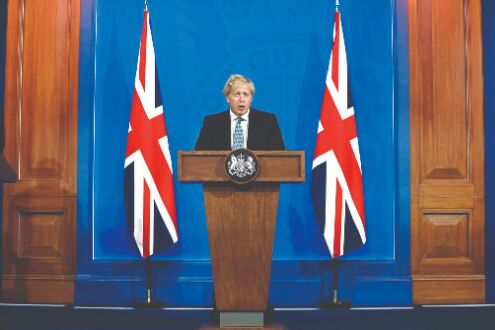UK defends delay in adding India to red list travel ban as Covid's B1.617.2 variant spreads rapidly

London: The UK government came under strong criticism on Sunday for not adding India to the red list travel ban at the same time as Pakistan and Bangladesh in early April, which is feared as a major factor behind a rapid spike in cases of COVID-19's B1.617.2 variant first identified in India.
Downing Street said it had taken a precautionary action to ban travel from India on April 23, six days before the B1.617 variant was put under investigation and two weeks before its highly transmissible subtype, B1.617.2, was labelled a Variant of Concern (VOC).
According to latest Public Health England (PHE) data, around 20,000 people travelled between India and the UK before the red list ban and around 122 of them arriving from Delhi and Mumbai between late March and April 26 were detected with the VOC.
Prior to India being placed on the red list in April, anyone coming to the UK had to test negative and quarantine for 10 days," a UK government spokesperson said.
However, the Opposition Labour Party attacked the government for a delay in acting when the variant first emerged at the end of March.
This was not inevitable. They should have put India on the red list. We've had this three-week period in which thousands of people have returned from India, including probably hundreds of cases of the variant, said Yvette Cooper, senior Labour MP and Chair of the Commons Home Affairs Committee.
When they did finally add India to the red list two weeks after they'd added Pakistan on April 9 they gave travellers four days' notice to rush back. Why didn't they introduce additional testing for those travellers before they were able to get on public transport home, she questioned.
UK Prime Minister Boris Johnson's planned visit to Delhi at the end of April, which was cancelled as the second wave of the pandemic surged in the country, is being cited by many as among the reasons for the delay in adding India on the red list despite higher infection rates per million than its neighbouring countries.
It comes as PHE revealed that cases of the B1.617.2 variant being tracked and traced in the community had more than doubled in a week to hit 1,313 cases this week. UK Health Secretary Matt Hancock admitted the VOC identified in India spread much more rapidly and may soon become the dominant variant in the country but also highlighted that based on the cases in the hotspot region of Bolton in north-west England, the indications are that those who are unvaccinated are more susceptible to hospitalisation.
He revealed that 18 people currently in hospital due to the B1.617.2 VOC have not had any dose of the COVID-19 vaccine even though they are eligible and urged all eligible over-38s to come forward for their jabs.



